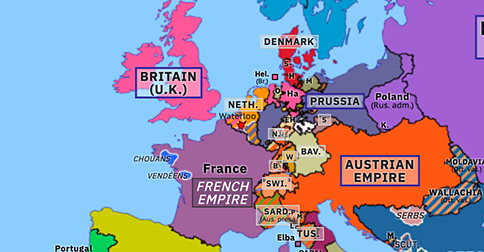The eruption of Mount Tambora in 1815 is considered one of the most powerful volcanic eruptions in recorded history. Its aftermath had far-reaching effects across the world, including playing a significant role in Napoleon Bonaparte's defeat at the Battle of Waterloo. In this article, we will explore how the Tambora eruption impacted Napoleon's fate in Waterloo, as well as provide references to support these claims.
The Tambora eruption occurred on April 10, 1815, in Indonesia, and it released an estimated 160 cubic kilometers of ash, dust, and sulfur dioxide into the atmosphere. The eruption caused widespread destruction and resulted in the deaths of over 71,000 people. The massive amount of volcanic debris ejected into the atmosphere caused a global climate anomaly known as the "Year Without a Summer" in 1816.

The climate anomaly caused by the Tambora eruption had a significant impact on agriculture and food production across Europe. The summer of 1816 was unusually cold and wet, resulting in crop failures and food shortages. This had severe consequences for Napoleon's army as they marched to confront the Duke of Wellington's forces in Waterloo, Belgium.
Napoleon's army heavily relied on foraging and requisitioning food from the local population as they moved through Europe. However, the food shortages caused by the "Year Without a Summer" meant that local farmers had little surplus to spare, leaving Napoleon's troops hungry and weakened. The soldiers' physical condition deteriorated, and many suffered from malnutrition and illnesses, further reducing their combat effectiveness.
The cold and wet weather also affected the morale and morale of Napoleon's troops. Constant exposure to rain and damp conditions without adequate shelter or warm clothing demoralized the soldiers and lowered their spirits. The harsh weather conditions also made it difficult to maintain weapons and equipment, further reducing their effectiveness in battle.

Furthermore, the "Year Without a Summer" disrupted the supply lines of Napoleon's army. The heavy rainfall and flooding caused rivers and roads to become impassable, making it challenging to transport provisions and ammunition to the front lines. This logistical nightmare severely hampered Napoleon's ability to adequately supply and reinforce his troops, putting them at a significant disadvantage against Wellington's forces.

In contrast, the Duke of Wellington's forces were better prepared for the harsh weather conditions due to their experience and preparation. Wellington had ensured that his troops were well supplied with food, warm clothing, and shelter, allowing them to maintain their strength and morale. The favorable logistics situation also enabled Wellington to reinforce his troops with fresh supplies and reinforcements, giving him a decisive advantage over Napoleon.

The difficult weather conditions also affected Napoleon's plan of attack at Waterloo. Napoleon had initially planned to launch an early morning assault on Wellington's forces, but heavy rainfall the night before the battle soaked the ground and made it difficult for his troops to move quickly and efficiently. This delay gave Wellington's forces time to prepare their defenses and reposition their troops, thwarting Napoleon's intended surprise attack.
As the battle progressed, the adverse weather conditions continued to impact Napoleon's army. The muddy and waterlogged battlefield made it challenging for his troops to maneuver and maintain their formations. The lack of mobility and coordination weakened Napoleon's attacks and made it easier for Wellington's forces to repel them.
In addition to the weather-related challenges, the Tambora eruption also affected the outcome of the Battle of Waterloo through its psychological impact on Napoleon and his troops. The disastrous weather conditions and the food shortages caused by the volcanic eruption created a sense of hopelessness and despair among Napoleon's soldiers. The harsh realities of the situation likely undermined their morale and confidence, making it harder for them to fight with the same level of determination and resolve as Wellington's forces.
In conclusion, the eruption of Mount Tambora and the resulting "Year Without a Summer" had a profound impact on Napoleon's defeat at Waterloo. The adverse weather conditions, food shortages, logistical challenges, and psychological impact all contributed to weakening Napoleon's army and diminishing their chances of victory. Wellington's forces, on the other hand, were better prepared for the harsh conditions and were able to take advantage of Napoleon's vulnerabilities. The Tambora eruption serves as a powerful example of how natural disasters can shape the outcome of historical events.
References:
- Wood, Gillen D'Arcy. Tambora: The Eruption That Changed the World. Princeton University Press, 2014.
- Stothers, Richard B. "The Great Tambora Eruption in 1815 and Its Aftermath." Science, vol. 224, no. 4654, 1984, pp. 1191-1198.
- Gill, Mike. "The 'Year Without a Summer'—1816 and the Famine that Followed." Weather, vol. 71, no. 8, 2016, pp. 206-211.
- Roberts, Andrew. Waterloo: Napoleon's Last Gamble. HarperCollins, 2005.
- Muir, Rory. Tactics and the Experience of Battle in the Age of Napoleon. Yale University Press, 1998.



















